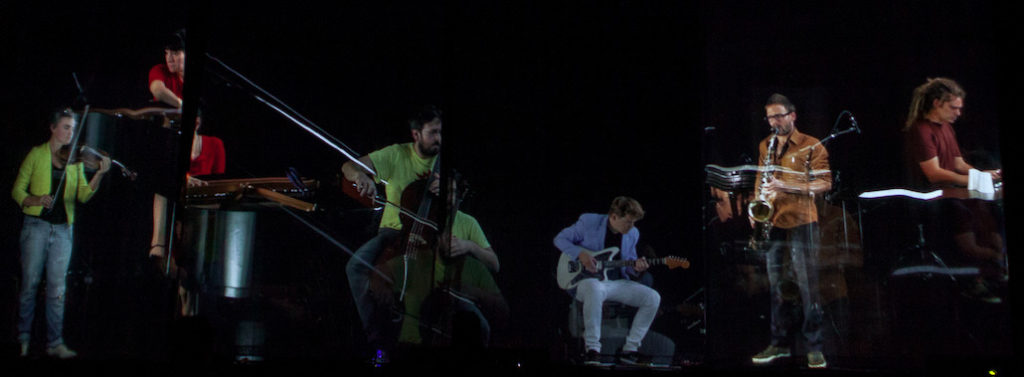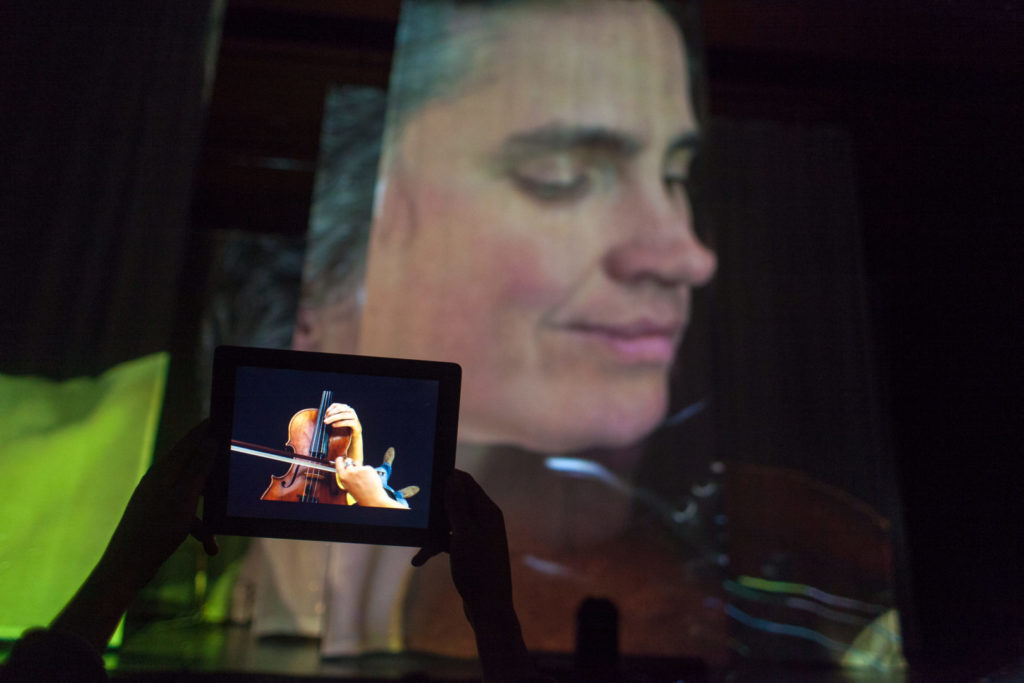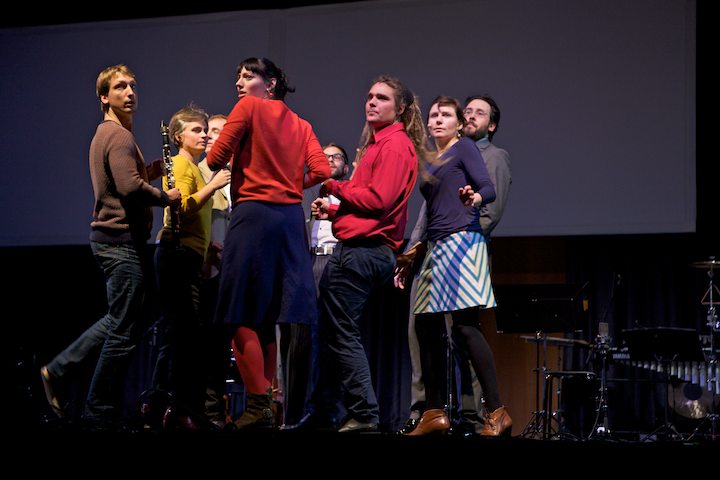
Stefan Prins: Mirror Box Extensions for ensemble, live video and live electronics (2015)
Scenography: Marieke Berendsen, Stefan Prins
Video: Kobe Wens
Light design: Marieke Berendsen
Michael Beil / Thierry Bruehl: Bluff – scenic composition for ensemble with live video and audio (2015)
Music and video: Michael Beil
Dramaturgy and stage direction: Thierry Bruehl
Co-producers: Music Centre De Bijloke Ghent (B), SWR Donaueschinger Musiktage (D)
Over the past few years, Nadar has often explored the theatrical border regions of its musical home through, among many other pieces, the multimedial compositions of co-artistic director Stefan Prins. Technological developments and their impact on our human lives and minds are key topics in Prins’s oeuvre. No doubt, one of his best-known pieces must be Generation Kill (2012), which in the New Yorker was praised for its thought-provoking reflection on the increasing role of virtual reality, e.g. in the form of remote controlled warfare and the use of drones. In Mirror Box Extensions the composer further examines the integration of man and technology. The hybrid body has now become a hyperbody, moving between the physical and virtual reality with remarkable ease.

Mirror Box Extensions
Mirror Box Extensions draws its title from the mirror box, a relatively simple medical tool designed to treat phantom pains in patients who have lost a limb. By placing the healthy hand or foot in a box with strategically placed mirrors, the image of the intact limb is reflected at the exact place where the lost hand or foot once was. The patient can then make symmetric movements where it seems like the lost limb is moving too, thus relieving the phantom pains.
This technique is based on the deliberate creation of an illusion and a seamless connection between a person’s real body and a virtual image. Precisely this phenomenon is at the core of Mirror Box Extensions, where it is being related to less innocent – or, at least, more invasive – modern technologies. After all, the divide between physical and virtual reality has become thinner than ever.
In just a few years Twitter and Facebook have conquered a key position in our social perception. Moreover, social media have become a battleground, a virtual arena where real events take place. The title of the third scene of Mirror Box Extensions, the quote “You will only be allowed to express yourself if you become a hologram”, refers to a striking incident that occurred in Spain in the spring of 2015. After the Spanish Government had forbidden gatherings in front of government building, the group “Holograms for Freedom” organized a virtual protest march against this new regulation. Since the flooded the streets of Madrid with holograms, they were not actually breaking the law and could not be prosecuted for their actions.
In Mirror Box Extensions shows a vision, in which everyone has multiple shapes and nobody knows what is real, recorded, original, or manipulated anymore. The physical reality and its virtual counterpart are getting entangled in an ever-expanding labyrinth, from which even the audience cannot escape.

Bluff
1.
Composer Michael Beil and director Thierry Bruehl cleverly dissect the musicians’ actions on stage, pulling apart image and sound, dissociating live actions and their recordings. By recombining these isolated elements, they are weaving an alienating web of new and unforeseen connections – disturbing, (un)recognizable, (un)befitting.
2.
Bluff is an everyday act. What latecomer is happy to admit that after a night of horrid dreams he preferred breakfast with cappuccino over a timely departure? We readily let other (and ourselves) believe that we are always confident, in a good mood, smart, and cool. Bluff has to remain invisible, hidden neatly behind a poker face. The show must go on.
In Bluff Beil and Bruehl present an theater of everyday (self)deception. The musicians’ actions suggest unspoken expectations, tensions, confusion and (self)doubt.
3.
«This is the difference between truth and fiction: fiction has to make sense» (The International, 2008)
4.
None of the musicians seems to know the whole script for the show. While trying to find their place in the ensemble and on stage, they are put on display under bright lights as if they were museum exhibits. Several will try to start playing as if it were a normal concert. Somebody sends the clarinet player on stage, all by himself. The piano player is first awaited by her colleagues, who then ignore her. The piano and its unfortunate player are being pushed around – literally – without any clear objective. The violinist and the cellist are presented with a difficult score which they decide to rehearse as quickly as possible.
Beil and Bruehl have trapped the musicians in a chess game with living pawns. They try to hide the intricate relay race of recordings and video projections behind a red velvet stage curtain, but eventually even they are exposed.
5.
Disclaimer: This is a work of fiction. Any resemblance to actual events or locales or persons, living or dead, is entirely coincidental.
Program notes: Rebecca Diependaele
